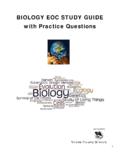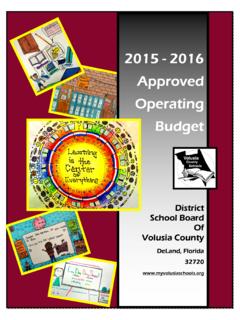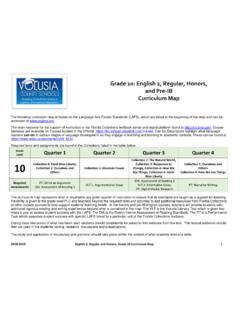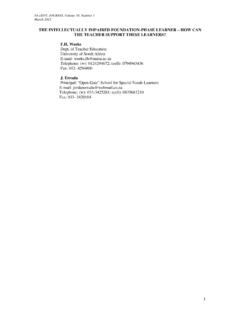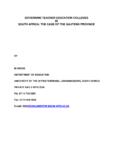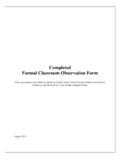Transcription of Month Content Skills Vocabulary Activity Assessment
1 Second Grade SCIENCE Curriculum Map 2018 - 2019 Volusia County Schools Next Generation Sunshine State Standards 2 Volusia County Schools Grade 2 Science Curriculum Map Elementary Science Department June 2018 Authorization for reproduction of this document is hereby granted. All trademarks and trade names found in this publication are the property of their respective owners and are not associated with the publisher of this publication.
2 Questions regarding use of this publication should be sent to the following: Volusia County Schools Elementary Science Department Becki Lucas Elementary Science Specialist DeLand, Florida 3 Volusia County Schools Grade 2 Science Curriculum Map Elementary Science Department June 2018 The Next Generation Sunshine State Standards for science are organized by grade level for grades K-8 and by Bodies of Knowledge for grades 9-12.
3 Eighteen Big Ideas are encompassed in grades K-12 and build in rigor and depth as students advance. Each grade level includes benchmarks from the four Bodies of Knowledge (Nature of Science, Life Science, Earth and Space Science, and Physical Science). Next Generation Sunshine State Standards Second Grade focuses instructional delivery for science within the following ten (10) Big Ideas/Standards: Nature of Science Big Idea 1 The Practice of Science Earth and Space Science Big Idea 6 Earth Structures Big Idea 7 Earth Systems and Patterns Physical Science Big Idea 8 Properties of Matter Big Idea 9 Changes in Matter Big Idea 10 Forms of Energy Big Idea 13 Forces and Changes in Motion Life Science Big Idea 14 Organization and Development of Living Organisms Big Idea 16 Heredity and Reproduction Big Idea 17 Interdependence Second Grade Overview 4 Volusia County Schools
4 Grade 2 Science Curriculum Map Elementary Science Department June 2018 Weeks of Instruction Instructional Scope Instructional Sequence Body of Knowledge Weeks 1 3 Introduction to Practice of Science August 13 August 31 Nature of Science Weeks 4 7 Earth September 4 September 28 Earth and Space Science Weeks 8 12 Weather October 1 November 2 Weeks 13 18 Properties of Matter November 5 December 19 Physical Science Weeks 19 23 Changes in Matter January 7 February 8 Weeks 24 28 Energy & Motion February 11 March 14 Weeks 29 35 Life March 25 May 10 Life Science Weeks 36 37 Basic Needs May 13 May 24 Weeks 38 Enrichment May 27 May 31 Nature of Science Depth of Knowledge, Formative Assessment Strategies.
5 And Digital Program Access documents are now available on the Science Canvas site under the Curriculum Maps button. Second Grade Instructional Scope and Sequence 5 Volusia County Schools Grade 2 Science Curriculum Map Elementary Science Department June 2018 ENGAGEMENT EXPLORATION EXPLANATION ELABORATION EVALUATION The engagement phase of the model is intended to capture students interest and focus their thinking on
6 The concept, process, or skill that is to be learned. During the engagement phase, the teacher is on center stage. The exploration phase of the model is intended to provide students with a common set of experiences from which to make sense of the concept, process or skill that is to be learned. During the exploration phase, the students come to center stage. The explanation phase of the model is intended to grow students understanding of the concept, process, or skill and its associated academic language.
7 During the explanation phase, the teacher and students share center stage. The elaboration phase of the model is intended to construct a deeper understanding of the concept, process, or skill through the exploration of related ideas. During the elaboration phase, the teacher and students share center stage. The evaluation phase of the model is intended to be used during all phases of the learning cycle driving the decision-making process and informing next steps. During the evaluation phase, the teacher and students share center stage.
8 What does the teacher do? create interest/curiosity raise questions elicit responses that uncover student thinking/prior knowledge (preview/process) remind students of previously taught concepts that will play a role in new learning familiarize students with the unit What does the teacher do? provide necessary materials/tools pose a hands-on/minds-on problem for students to explore provide time for students to puzzle through the problem encourage students to work together observe students while working ask probing questions to redirect student thinking as needed What does the teacher do?
9 Ask for justification/clarification of newly acquired understanding use a variety of instructional strategies use common student experiences to: odevelop academic language oexplain the concept use a variety of instructional strategies to grow understanding use a variety of Assessment strategies to gauge understanding What does the teacher do? provide new information that extends what has been learned provide related ideas to explore pose opportunities (examples and non-examples) to apply the concept in unique situations remind students of alternate ways to solve problems encourage students to persevere in solving problems What does the teacher do?
10 Observe students during all phases of the learning cycle assess students knowledge and Skills look for evidence that students are challenging their own thinking present opportunities for students to assess their learning ask open-ended questions: oWhat do you think? oWhat evidence do you have? oHow would you explain it? What does the student do? show interest in the topic reflect and respond to questions ask self-reflection questions: oWhat do I already know? oWhat do I want to know? oHow will I know I have learned the concept, process, or skill?


